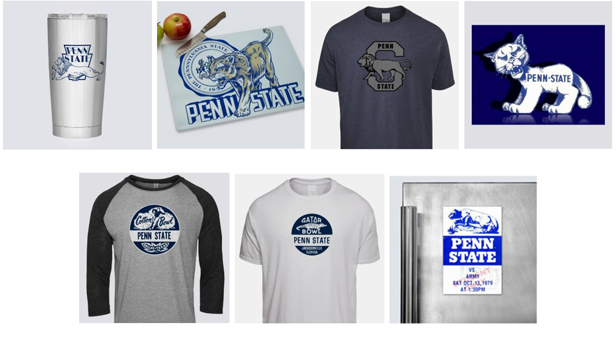November 14, 2024
Trademark Trial Involving Penn State & Print-on-Demand Company Kicks Off
Vintage Brand says it’s printing vintage images available in the public domain on products, but Penn State and others say the company’s entire business is built on trademark infringement.
Key Takeaways
• No Violation Asserted: Vintage Brand says that it’s using historic images from vintage memorabilia as the designs it prints on products, claiming this does not infringe trademarks.
• Legal Battles: Major U.S. universities, including Penn State, argue the company’s practices cause consumer confusion and unfair competition.
• A Gamechanger? This trial that pits Penn State against Vintage Brand could reshape trademark law, complicating enforcement and licensing for trademark holders.
Vintage Brand says it’s well within the law to take what it describes as “historic artistic images” reproduced from so-called “vintage memorabilia” and print the designs on apparel, drinkware, hats, can coolers and other products it then sells to fans of a long list of American universities and professional sports teams.
Still, more than a dozen major colleges and universities in the United States say the Washington-headquartered print-on-demand company’s business model is one massive exercise in trademark infringement.
They’re either suing or previously had suits against Vintage Brand. One of those cases, involving The Pennsylvania State University, began coming to a head this week as a jury trial got underway in federal court in the Keystone State. It’s the first of the suits to come to trial, with at least one other settled before the trial stage.

Some legal experts say that if Vintage Brand prevails, the case could shake the foundations of trademark law and make it much more difficult for trademark holders – whether sports teams, universities or any type of brand – to enforce what they believe to be their legal rights on their marks. That stands to impact branded merchandise trademark holders who may wish to sell or license merch to be sold.
“If this goes in Vintage Brand’s favor, then it will open a door for retailers and fans to basically start creating and selling merchandise in a way that the licensor, the trademark owner, would no longer be able to control,” attorney Tiffany Gehrke, partner at Marshall Gerstein & Borun LLP, tells Law 360.
Other attorneys don’t go that far in their assessment, but say that, at the least, it could become harder and more expensive to defend trademarks for holders, while also reducing licensing value and creating more competition for merch revenue.
As such, the case bears relevance for printing and promotional products professionals, who deal daily with logos, branding, graphics, and the implications of intellectual property and copyright law.
The Penn State Perspective
Penn State sued Vintage Brand, its majority owner and co-founder Chad Hartvigson, and Sportswear Inc., a Kentucky-based company that produces the graphic apparel and other products Vintage Brand sells. Hartvigson is reportedly a minority owner in Sportswear Inc.
Filed in 2021, the case took three years to get to trial. Most basically, Penn State contends that Vintage Brand is illegally using the university’s registered and common law trademarks without permission.

Officially licensed Penn State gear, bearing the university’s legally held trademarks.
Vintage Brand holds no hold licenses with Penn State, and the designs it offers and ways it markets itself online – there are no brick-and-mortar stores – make the company’s products “virtually indistinguishable” from licensed Penn State products, the university maintains.
According to Penn State, such practices cause consumer confusion, duping supporters of the Nittany Lions into thinking they’ve bought an actual licensed product from the university. As such, the university says Vintage Brand is illegally leveraging Penn State’s brand/trademarks to compete with Penn State and make money without proper licensing, all without financial benefit to the school.
An attorney for Penn State said in court this week that an expert will testify that patrons who bought from Vintage believed the website was supported by Penn State.
And that’s a critical point, the Penn State camp asserts, because it shows that shoppers link the marks/images with the university, thereby meeting a standard for authentic source identification that they argue is part of constituting a trademark violation.
Deciding if that’s true or not figures to be one of the burdens on the jury.
Taking into account the source identification angle and other factors, some attorneys think Penn State has a clear case for trademark infringement and are surprised the suit has reached the trial stage.
“That this is going to a jury is just mind blowing to me,” attorney Preetha Chakrabarti of the firm Crowell & Moring LLP tells Bloomberg Law.
Adds attorney Josh Gerben of Gerben IP in that same Bloomberg Law piece: “Why does another company get to exploit” a university’s brand?
The Vintage Brand View
Vintage Brand thinks Penn State has it all wrong.
For starters, the company says it has not sold a single item that bears a legally held Penn State trademark. Rather, the Penn State-related graphics it printed on products were based on “vintage designs” that were historic and available in the public domain, the print-on-demand provider asserts.
While the items clearly say “Penn State,” “Pennsylvania State University” and contain graphics one would associate with the university – like the Nittany Lion – the particular designs are not within Penn State’s stable of trademarks, according to Vintage Brand. The graphics are based on game tickets, decals, buttons and other items produced before 1989, the defendant says. The images featured on about 35 products and sold from 2018 to 2021, generated about $25,000 for Vintage Brand, according to the company.

Vintage Brand was printing on demand and selling these Penn State-themed products, but says that doing so does not violate the university’s trademarks.
While Penn State asserts the designs cause consumer confusion, leading people to think they’re official Penn State gear and thus a legal violation, Vintage Brand says shoppers can’t make that mistake, because on its website and clothing hang tags there are disclaimers disavowing any association, such as that the company is “not affiliated with, licensed, or sponsored by any college, team or league.”
An attorney for Vintage Brand said in court this week that the brand will provide expert testimony to back up such claims. The arguments found a receptive ear in February this year when U.S. District Judge Matthew W. Brann denied a Penn State request for summary judgement in the case.
“Although the historical images indisputably incorporate Penn State trademarks,” Brann said, “the images are visually distinct from those trademarks, and Vintage Brand provides numerous disclaimers on its website that disavow affiliation with any university. These facts mean that many of Penn State’s claims fail.”
The case was sent to trial and now it remains to be seen if a jury will feel similarly.
Relatedly, jurors will also hear an argument from Vintage Brand that the designs it prints are protected by law allowing for such graphical use when its only ornamental and aesthetic. The line of legal reasoning is, in part, that fans purchase the branded gear to proclaim their affinity for a team/school, rather than because they believe the trademark holder has made or approved the products, thus nixing the source-deception argument in favor of trademark infringement.
In a court filing tied to the case, a group of 18 law professors backed that thinking, saying in effect that people wear team-branded merch as an expression, not as a means of identifying the source, i.e. the trademark holder. If accepted, that interpretation triggers First Amendment concerns and would appear to open the door to freer, expressive use of graphics associated with teams or brands, the thinking goes.
Vintage Brand has stopped selling the Penn State-themed gear, pending the outcome of the trial, which is expected to last nine days. Whoever prevails, appeals are likely, attorneys say, possibly as high as the U.S. Supreme Court.
Print and promo pros, along with the entire merch licensing world, should keep an eye on this one.
